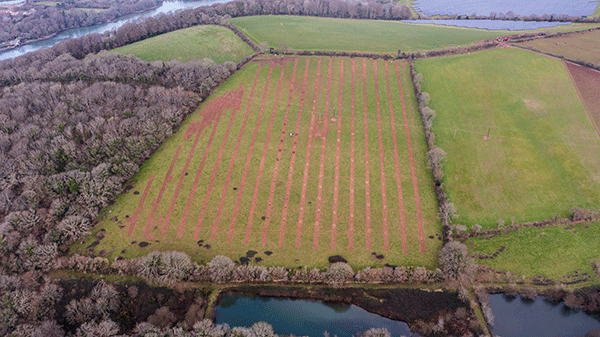It’s been interesting, and a little sad, to see the backlash and mud-slinging sparked by George Monbiot’s new book take place on social media. The journalist and author’s latest offering, Regenesis, is described as a “breath-taking vision of a new world” on its inside front cover, but as many farmers would have it, it is narrow-minded and selective in its approach to save the planet with, what they see, as little understanding of the needs of food production and how it can be done.
As someone who writes about sustainable food for a living, I felt like I should have a view on which side is ‘right’. Full disclosure, I received a review copy of Regenesis and have spent the last week selecting an excerpt I felt would offer something new to what seems to be a spiralling and largely angry echo chamber.
The excerpt I chose appealed as a quieter, less dramatic ‘solution’ explored in the book – that of perennial grains. The topic of biodiversity in plants is still far from understood and used in the mainstream conversation around public health and commercial farming.
In fact, there is huge potential in researching and developing plants that do not require re-planting every year, which can store carbon in the ground, while yielding a nutritious food source. Less lucrative and certainly more long-term than a quick fix gene edit, perhaps, which is why it hasn’t quite grabbed the attention of all those multinationals hoping to altruistically feed the world.
I understand much of what farmers are saying – livestock plays a crucial role in gradually helping to replace fertiliser, and organic livestock in particular has a much wider beneficial impact around animal welfare, allowing biodiversity to thrive, and protecting water courses through much restricted antibiotic usage.
Monbiot, on the other hand, sees the extensive [read free-range] livestock system as inefficient, in the amount of land used to produce food ratio, and focuses instead on any and all possible alternatives, including fermented bacterial protein to drastically replace our reliance on animal protein and animal feed crops.

In some ways, his unrelenting focus on the ecological crises facing the world is understandable. Facing up, fully, to the dramatic changes that are coming our way through the climate crisis usually does (or at least should) provoke an extreme reaction.
But back to the book, where I was soon absorbed in a range of farmer interviews and case studies much like the ones we would, and do, feature on Wicked Leeks.
We meet Ian Wilkinson, the farmer behind the FarmED agroecological demo farm in the Cotswolds, meticulously growing crops with no inputs and minimal tilling (the key to healthy soil) alongside links with producers, bakers and local markets.
Agroecology is a less sexy, but probably more long-term, description than regenerative for what’s going on in sustainable food and farming at the moment – combining the need for sustainable farming, with markets that reward farmers, plus a focus on jobs, livelihoods and social justice.
The problem that Monbiot finds is the same as any entrepreneurial farmer might also spot, though from a different lens. Yields are good, but the rotations, to build up the right fertility in the fields without chemicals, are long enough that the farm cannot provide food every year from every field – hence a local consumer would have to top up from elsewhere, likely from much further afield, where habitats and soils are less protected.
Then there is the chapter most people melt down at – a world that is ‘free of farms’. In Monbiot’s thinking, this is bacterial fermentation to provide edible protein and he visits a facility that is powered by renewable energy and can, he says, be feasibly produced anywhere in the world.
The problem here is probably not the technology, which might well have a place, but how it is powered, who owns it and benefits from it. How will it be kept out of the hands of the same corporate food system structures? All questions that are also raised, if not answered.
One of the main issues for me is how to connect people with this era of change – I’m not convinced a land-free but ultimately disconnected process of producing food will bring enough people along with it – we need a connection to nature and our food to be strengthened, not weakened.
Systems like agroecology place people at their heart, rooted in a political understanding of inequality and social justice, and an awareness that our current food system leaves millions across the world either disconnected, malnourished or underpaid.
The point is there is nuance to be found in these pages, even if you don’t agree with the overall conclusion that land use is the most important environmental metric and must be conserved for nature at all costs.
I find the divisive reaction to Monbiot, and it comes from many sides and as some have pointed out isn’t entirely un-useful for a book launch, distracts from what needs to be an urgent, collaborative and progressive era of change for food and farming.
More importantly, while there will always be disagreement, there are also some hugely vested corporate, if not political, interests hovering over the angry cesspits of social media, who don’t care at all about the outcome as long as strong views translate into strong, influenceable behaviour.
I do believe there is another way, reading carefully for yourself, avoiding the tribalism, and recognising that just like our soils, our food system needs diversity. It feels like the only way that change will happen.














Thanks for an excellent review. I do feel sorry for farmers doing their best to work the land in the best way possible. Farming and food production at all levels is a big part of being human, where we do things well and badly. The ideas of a world full of synthetic food is ugly, but, if replacing industrial agriculture, a good thing. Small scale mixed and more sustainable farms would continue to do what they do, but will not be affordable by half of the population as there is too much wealth and too much poverty. Conservative food policy seems to be about providing cheap enough food to enable poverty to be acceptable.
It’s a tough time for farmers caught in the middle of these ‘great’ debates and painted as architects of industrial farming. But really they’re victims of an economic system that seeks to create value/profit for those at the top.
I think George Monbiot has a key part to play in dragging the debate to a more progressive place, it makes everyone else’s position look less radical, which is valuable in and of itself.
But where are the people? I think he conveniently forgets that any radical shift in food/farming needs to take people along for the ride. How do you persuade farmers to intellectually get on board with the vision, as well as addressing the complex cultural, financial and technical barriers that block the transition to sustainable farming practices? Not to mention, how do you get us, the people, to eat fermented bacteria: that’s a whole other set of issues.
But maybe that’s not his problem/expertise.
The first review that actually looks at the arguments without genuflecting or giggling (embarrassed gurgles from the Spectator), so compliments.
I’d just like to point out that bacterial fermentation is already a huge industry and everyone is quite happily glugging litres of the stuff with smiles on their faces. In the real world it is called yogurt. I fully realise that a crazy man who decided to recreate a pork chop through some unlikely fermented matter might meet with problems at the supermarket, but protein drinks on the other hand are also big business. Who would imagine any rather…oh, how can I describe these people in a politic way, well muscle-bound fellas would be glugging down litres of water filled with white protein powder?
Your most precious point, however, is that Monbiot conveniently forgets diversity in foodstuffs, and hasn’t even approached the dangers of factory-produced bacteria contamination.
Finally, we should have learnt from the pandemic that there is one real solution, and only one real solution, and that is that we simply stop. The sneaky feeling that our planet is trying to kill us off really is unavoidable and totally understandable. If Monbiot is right, then we are well on the way to several tipping points, whether in the food chain, our oceans, the weather or whatever…and the consequent loss of life on a scale never imagined might ensure the planet’s survival. I know several people camped out in Wales who have been waiting for just such an occurrence for over 40 years now! Not too long to wait now!